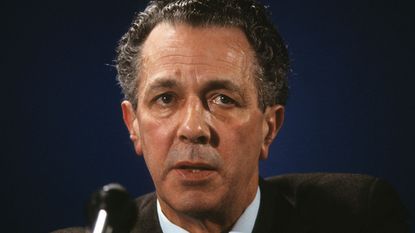Why we need to get a grip on our government
Our government is trying to do too much, enacting policies that are destructive to the private sector. It needs to drop the the feel-good nonsense and create policies that lead to long-term wealth, says Merryn Somerset Webb.


Is there a glut of oil on the way? It doesn’t feel like it at the moment. Years of well meaning lack of investment into fossil fuels have tightened the market (the effect being similar to that of the Opec crisis in the early 1970s) and most analysts are now assuming the supply and demand mismatch will last for some years to come. But is this just to make yet another extrapolation mistake?
In most commodity markets, the cure for high prices is high prices – and there is no reason to think this will be any different, says Max King in this week's magazine. Already, governments and investors are busily backtracking on their opposition to fossil-fuel investment and there is likely be a “significant supply response” from Opec, the US (shale) and Venezuela. This time next year and it may be that the £100 tank of petrol is nothing but a distant nightmare, something that could solve a lot of our problems.
The real causes of inflation
Not everyone is convinced by this. Barry Norris points out that investment in the search for new oil and gas reserves is down 66% on a decade ago, and in this week’s podcast Charles Schwab’s Liz Ann Sonders notes that the environmental, social and governance (ESG) agenda is very much at odds with support for fossil-fuel exploration.
Subscribe to MoneyWeek
Subscribe to MoneyWeek today and get your first six magazine issues absolutely FREE

Sign up to Money Morning
Don't miss the latest investment and personal finances news, market analysis, plus money-saving tips with our free twice-daily newsletter
Don't miss the latest investment and personal finances news, market analysis, plus money-saving tips with our free twice-daily newsletter
It also may not make the definitive difference the optimists think. The truth is that much as it suits politicians and central bankers to blame inflation on oil prices – and to claim oil prices are only up as a result of war in Ukraine – inflation is caused by governments. But inflation is really the result of politicians “trying to do too much too quickly”, says Andrew McNally of Equitile investments (quoting a 1974 speech from Keith Joseph, later Margaret Thatcher’s head of policy), creating and spending far too much money in the process.
This happened in the run up to 1974 when governments (terrified that they may again see the mass unemployment of the 1930s) tried to spend their way out of their problems. Government spending relative to GDP is at a historic high in the UK (albeit not quite as high as it is in many of our EU neighbours) and “higher inflation always follows higher spending”.
Our government is once again trying to do too much (see Matthew Lynn's column this week on why borrowing your way out of a crisis rarely works) and doing so while also enacting policies that are hugely destructive to the private sector – think lockdowns, the green agenda and the relentless rise of regulation.
Getting a grip on government
Note that the number of people working in the civil service is up 24% since 2016. The state is too big; it costs too much – and at some point it will be clear that it is crowding out the private sector. Not much long-term good can come of this. Oil prices may or may not self-correct, but unless governments get a grip, stagflation – and its nasty effects on our wealth and our living standards – will not.
MoneyWeek is in (fairly) rare agreement with The Economist on this matter: it is time for the UK to start making a few more of the hard choices that lead to long-term wealth and fewer of the feel-good ones that have got us where we are today. Markets like this kind of thing: by the end of the 1970s £100 invested at the top of the market was worth only £61 in real terms. By the end of the 1980s (after some work from Thatcher and Joseph) it was worth £261.
Merryn Somerset Webb started her career in Tokyo at public broadcaster NHK before becoming a Japanese equity broker at what was then Warburgs. She went on to work at SBC and UBS without moving from her desk in Kamiyacho (it was the age of mergers).
After five years in Japan she returned to work in the UK at Paribas. This soon became BNP Paribas. Again, no desk move was required. On leaving the City, Merryn helped The Week magazine with its City pages before becoming the launch editor of MoneyWeek in 2000 and taking on columns first in the Sunday Times and then in 2009 in the Financial Times
Twenty years on, MoneyWeek is the best-selling financial magazine in the UK. Merryn was its Editor in Chief until 2022. She is now a senior columnist at Bloomberg and host of the Merryn Talks Money podcast - but still writes for Moneyweek monthly.
Merryn is also is a non executive director of two investment trusts – BlackRock Throgmorton, and the Murray Income Investment Trust.
-
-
 Investment trust discounts hit 2008 levels. Here’s how to profit
Investment trust discounts hit 2008 levels. Here’s how to profitInvestment trust discounts have risen to levels not seen since 2008, here are three trusts looking to buy to profit.
By Rupert Hargreaves Published
-
 A luxury stock to buy at a high street price
A luxury stock to buy at a high street priceInvestors wrongly consider Watches of Switzerland a high-street outlet.
By Dr Matthew Partridge Published
-
 UK wage growth hits a record high
UK wage growth hits a record highStubborn inflation fuels wage growth, hitting a 20-year record high. But unemployment jumps
By Vaishali Varu Published
-
 UK inflation remains at 8.7% ‒ what it means for your money
UK inflation remains at 8.7% ‒ what it means for your moneyInflation was unmoved at 8.7% in the 12 months to May. What does this ‘sticky’ rate of inflation mean for your money?
By John Fitzsimons Published
-
 VICE bankruptcy: how did it happen?
VICE bankruptcy: how did it happen?Was the VICE bankruptcy inevitable? We look into how the once multibillion-dollar came crashing down.
By Jane Lewis Published
-
 Would a food price cap actually work?
Would a food price cap actually work?Analysis The government is discussing plans to cap the prices of essentials. But could this intervention do more harm than good?
By Nicole García Mérida Published
-
 What is Warren Buffett’s net wealth?
What is Warren Buffett’s net wealth?Features Warren Buffett is one of the world’s richest people. But how did he make his money?
By Jacob Wolinsky Last updated
-
 What is Rihanna's net worth?
What is Rihanna's net worth?Features Rihanna became the youngest self-made billionaire in 2022. Here’s how she made her money.
By Jacob Wolinsky Published
-
 UK inflation slides to 8.7% - what does it mean for your money?
UK inflation slides to 8.7% - what does it mean for your money?News Inflation has dropped below 10% for the first time in months, but with food prices at a 45-year high, is this good news and what does it mean for your money?
By Tom Higgins Published
-
 What is Bill Gates's net worth?
What is Bill Gates's net worth?Features Bill Gates is one of the world’s richest people, but how did he make his money?
By Jacob Wolinsky Last updated









